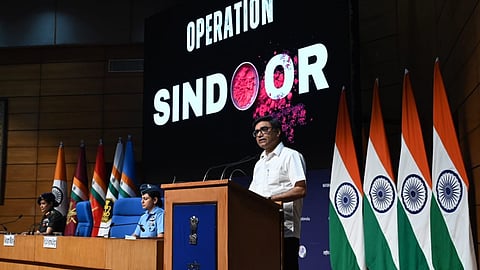

NEW DELHI: India’s Operation Sindoor was not merely conceived as a retaliatory action, but as a military measure intended to achieve three specific objectives: to prevent further terrorist activity, to deter the use of cross-border proxies by Pakistan-based terror groups, and to pre-empt identified threats.
The operation, which targeted known terrorist infrastructure in Pakistan and Pakistan-occupied Kashmir, was described by Indian officials as measured, proportionate, and non-escalatory.
This approach reflects a shift in India’s counter-terrorism posture — emphasising limited, intelligence-driven strikes into terror infrastructure wherever it is in Pakistan, as a means of enforcing accountability while trying to manage the risk of broader conflict.
Framed within a larger counter-terror doctrine, Foreign Secretary Vikram Misri’s statement to the press following the strikes explained the Union government's logic, legality, and limits of India’s military action. The undertone of his remarks was how India sought to impose escalating costs on Pakistan while avoiding open escalation.
On 22 April, Pakistan-trained terrorists affiliated with Lashkar-e-Taiba (LeT) offshoot, operating under the cover name The Resistance Front (TRF), carried out a brutal attack in J&K's Pahalgam, killing 26 people.
Misri termed the attack the "largest number of civilian casualties in a terrorist attack in India since" 26/11"—something India has underlined to the UNSC members in the briefing. He described the killings as "marked by extreme barbarity", noting that many victims were executed with headshots at close range, in front of their families.
The motive, he said, was clear: "undermining the normalcy returning to Jammu and Kashmir," particularly by targeting the booming tourism sector, which saw 23 million visitors the previous year.
It was a psychological and economic attack meant to "traumatise families" and "provoke communal discord."
The TRF's claim of responsibility, its ties to LeT, and digital forensics pointing to Pakistan-based handlers painted a damning picture.
Misri stressed that India had repeatedly warned the UN’s 1267 Sanctions Committee of TRF’s function as a Lashkar front. He also highlighted Pakistan's attempts to suppress references to TRF in international fora, saying, “Pakistan's pressure to remove references to TRF in the 25 April UN Security Council Press Statement is notable.”
Investigations yielded “communication notes of terrorists in and to Pakistan,” reposted by Lashkar-linked social media accounts, alongside eyewitness identification and other operational leads.
Misri pointed to a consistent pattern: "The features of this attack also tie in with Pakistan’s long track record of perpetrating cross-border terror in India, which is well documented, and beyond question.”
India initially responded diplomatically on 23 April, but Misri explained that no credible action was taken by Pakistan against the perpetrators.
In contrast, Islamabad resorted to denial and deflection, repeating old patterns of obfuscation. "Despite a fortnight having passed since the attacks, there has been no demonstrable step from Pakistan... Instead, all it has indulged in are denials and allegations,” he said.
Meanwhile, Indian intelligence intercepted indications of imminent attacks, prompting the government to act on preventive, deterrent, and pre-emptive grounds. Misri also spoke about the rationale of the government.
“There was thus a compulsion to prevent, deter, and to pre-empt.”
India launched Operation Sindoor in the early hours of Wednesday, targeting nine terror camps in Pakistan and Pakistan-occupied Kashmir. The precision missile strikes were aimed at disabling active terror infrastructure and killing operatives who were preparing future attacks.
Misri framed the strikes as legitimate: “India exercised its right to respond and pre-empt as well as deter... These actions were measured, non-escalatory, proportionate, and responsible.”
He emphasised that only terror infrastructure was targeted — no civilian, economic, or military sites in Pakistan were hit.
India also anchored its actions within the language of the UN Security Council’s 25 April press statement, which had called for accountability for the perpetrators and sponsors of the Pahalgam attack.
Operation Sindoor signals a decisive shift in India’s counter-terror playbook — a doctrine that seeks to raise the costs of cross-border terrorism.